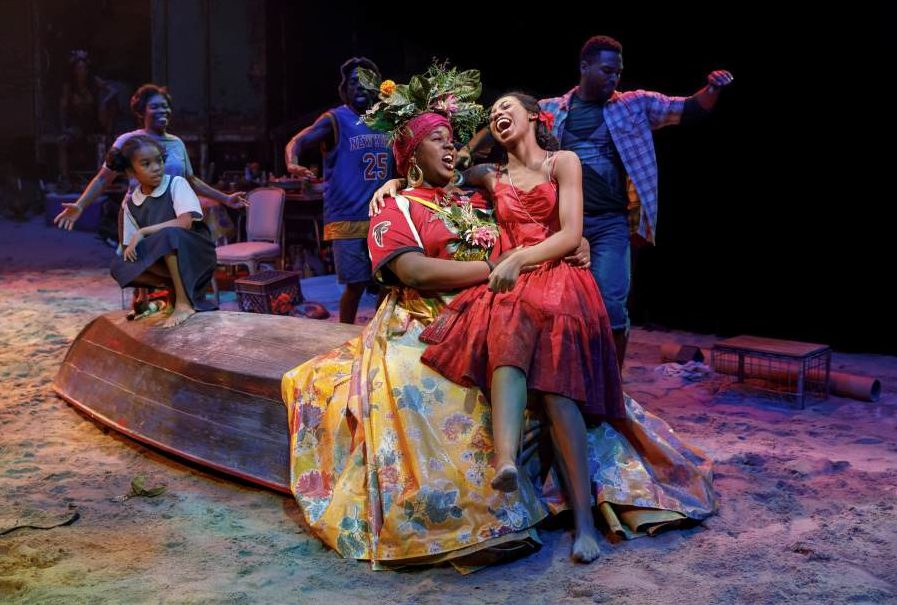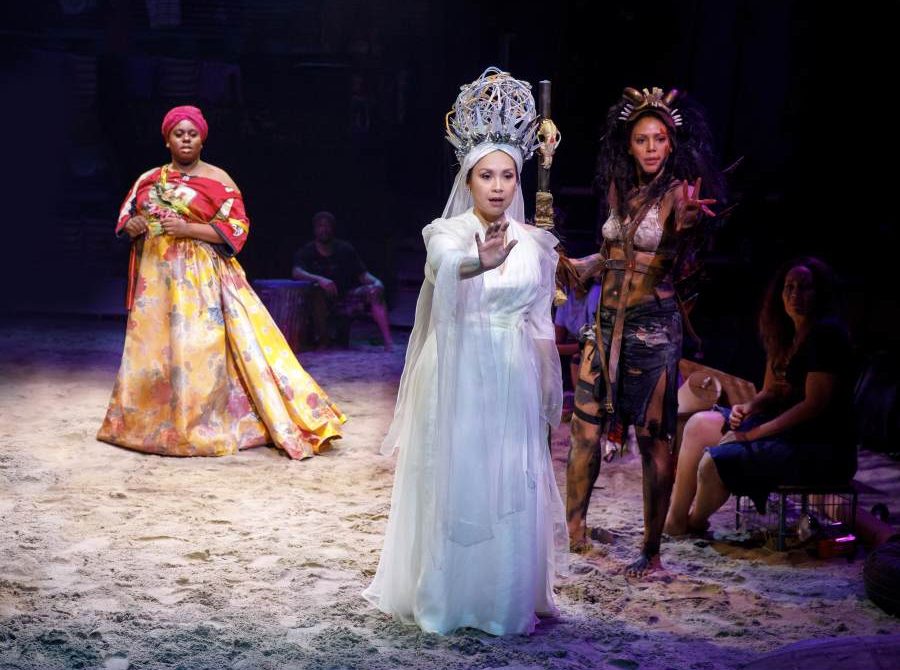

“Love has many powers. If the love is true, it can cross the earth and withstand the storm.”
With just one step into the Circle in the Square Theatre, you’re immediately immersed in the authenticity of this magical, mystical Caribbean island. As you make your way to your seat, you’ll hear the sound of rolling waves encompassing the room, as you take note of the clotheslines that border the back of the auditorium, boasting tie-dyed outerwear of the island inhabitants. Down below, the islanders bicker companionably and pal around with each other, establishing the communal aspect of the individual islanders, while displaying hints of the rivalry that will soon fuel the main incentives of the plot. To boot, the floor of the stage is completely enveloped in sand, a feat bested only by the actual running water, which gathers in a pool at stage left. And just when you think it couldn’t get any more surreal, a live goat bounds from one side of the space to the other. And with that, you’ve arrived. You’re living the life of these inhabitants along with them, and you know — before a single scripted line is even spoken — that it’ll be an experience you’ll never forget.
Part Romeo and Juliet, part Little Mermaid, all turned on its head with a calypso-infused Haitian twist, Once on This Island, by Lynn Ahrens (book/lyrics) and Stephen Flaherty (music), tells the story of Antillean peasant girl Ti Moune, who dreams of reuniting with the white-skinned grand-homme Daniel from the other side of the island, after saving him from a devastating car accident on the local streets. Guided by the gods of love, water, and Earth — while skillfully evading the Demon of Death — she’s put to the ultimate test of life and loyalty, forced to prove once and for all that the strength of love can withstand the power of death.
With such classic hits as “Waiting for Life,” “Forever Yours,” and “Mama Will Provide” (the latter number being particularly impactful in this iteration, thanks to a powerhouse performance by Glee fave Alex Newell), there’s no question the beloved score is clearly a highlight of the experience, touching our hearts just as much now as it did throughout the musical’s original 1990 Broadway run. But, as seasoned theatergoers can tell you, the key to any successful revival is in its ability to present the material afresh, uncovering new elements and opening new doors, to allow the audience to separate the production from its predecessor. Without fail, incomparable director Michael Arden undeniably succeeds in this endeavor, injecting the production — just as he did in helming the smash-hit Deaf West production of Spring Awakening in 2015 — with his unparalleled Midas touch.

It’s all in his embrace of using the basics: sound is produced not from a sound system, but from the utilization of found objects, be they rainsticks, torn electrical tubes, broken beer bottles, tire parts, or other scraps and remnants strewn about the streets as a result of the disastrous storm that occurs early on in the story. Similarly, Daniel’s vehicle is fashioned from actors grabbing four separate car parts and joining him at center, navigating the storm with a singular steering wheel. When one person steps up to tell a part of the story, the others fill in with noises like the sound of a bird or the clap of a thundercloud. When the Gods call upon their respective elements (among them fire, steam, wind, and rain, to name a few) their effects emanate throughout the theatre.
All these components are essential factors into what gives this revival its refreshingly original feel. But it’s Arden's work in this aforementioned opening sequence that leaves the biggest mark, especially given the story as a whole, with almost the entire cast gathered in day clothes interacting with each other, just as average neighbors or townspeople do in their daily lives. Gods, healers, and storytellers they may soon become, but for these first opening moments, they’re simply average people. Just as us “ordinary folk” are settling in to see this story come alive, they’re also portrayed as average people, taking a break from their work, coming together to hear this story. This choice, coupled with Arden's decision to gender-bend a handful of pivotal characters, helps to stress the idea that while we are all different people and come from different backgrounds, much like the people of the Jewel of the Antilles, we are all one, united in our pain, grief, hope, faith, and most importantly, our unconditional life. The story they unfold for us is a universal one, and at its heart, it affects us all the same: even the ordinary can become extraordinary. In presenting it through the lens of the inhabitants portraying literal storytellers, it allows us to accept the universality as truth, resulting in a powerful, poignant punch when it all eventually unravels at show’s end.
In terms of the performers themselves, well, you know you can’t get any better than this trusty group. Backed by perennial standouts like Tony-nominee Philip Boykin, whose booming baritone will instantly cure all your troubles, and Broadway’s token princess Lea Salonga, who ignites all the feels with her delivery of “The Human Heart,” the supporting cast is nothing short of delightful, as is lauded leading man Isaac Powell, who commands the room in a first-rate debut as the aristocratic Daniel.
But it becomes clear fairly quickly that the success of a show like this one lies squarely on the shoulders of its youthful leading lady. With an impressive air of maturity and a set of dazzling dulcet tones to match, there’s no question 18-year-old newcomer Hailey Kilgore is up to the task, carrying the intimate production on her nimble limbs with ease and aplomb. She may be one small girl, but she’s clearly a force to be reckoned with, proving herself not only worthy but capable of being in a league all her own. She’s the fresh face with the big heart, and the even bigger voice — equally compelling in the heart-wrenchingly heavy dramatic moments as she is the lighthearted ones, demurely daydreaming of a life free of prejudice and obstruction. No matter what the scene calls for, this surefire star-in-the-making brings her A-game and delivers in spades. Simply put, she is an unequivocal star. And while Ti Moune’s journey may end each night at final blackout, it’s clear Kilgore’s journey is just beginning. She’s going somewhere….going far. And oh, what a beautiful story she’ll weave.